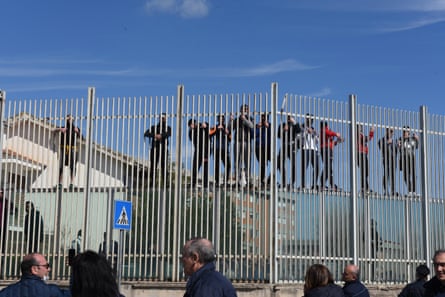Prisons around the world can expect “huge mortality rates” from Covid-19 unless they take immediate action including screening for the disease, the World Health Organization has warned.
All visitors to prisons along with staff and new admissions should be subject to airport-style temperature testing and health assessments at point of entry, the agency has recommended under new guidelines published today.
The agency warns that any efforts to control Covid-19 in the wider community will fail unless strict measures to stop infection, including adequate testing, are taken in all places of detention.
Dr Hans Kluge, the WHO’s regional director in Europe, told the Guardian: “Covid-19 knows no boundaries; this includes transmission between detainees, facility staff, visitors, and undoubtedly extending outward to (re)infect the general public. Only the boldest of actions will slow and stop the spread of disease. We must not leave anyone behind in this fight.”
He added: “Prison settings are both a threat for the transmission of infectious diseases, and an opportunity for its prevention and control.
“Having practised as a tuberculosis physician in prison systems, I wholeheartedly urge all governments to heed the guidance we have prepared through a rapid and global consultation process with experts.”
There are more than 10 million men, women and children in prisons worldwide and jails are overcrowded in at least 121 countries, according to a 2019 report on global prison trends.
Overcrowding means it is not possible in prisons to respect the guidelines around hand washing with soap, individual towels and social distancing.
Prisons have high rates of disease, substance dependency and mental illness. Communicable diseases are a particular concern with infection rates for tuberculosis, for example, between 10 and 100 times higher than in the community.
John Podmore, former governor at three British prisons and now a professor of applied social sciences at the University of Durham, said: “We are talking about a place where it is easier to come by illicit drugs than toilet roll, where soap is scarce, where towels are changed once a week if you are lucky, maybe once a month.”

WHO guidelines say limiting access to prisons to non-essential staff and visitors should be considered and everyone should be screened for fever and lower respiratory tract symptoms, irrespective of whether or not there are suspected Covid-19 cases in the community.
“We are talking about a highly vulnerable population in overcrowded conditions and once Covid-19 gets inside prisons, everyone will be contaminated very quickly,” said Carina Ferreira-Borges, the WHO’s coordinator for prison health.
“There is a risk of a huge mortality rate and unprecedented burden on the national health systems of countries that are already overstretched,” she said.
“In a worst-case scenario this is going to be exploding in prisons and then people will want to get out so there will be a security issue. If people start dying what will the response be? Prisons must prepare now to respond to epidemics.”
In Italy, the country worst-hit by the pandemic, there was rioting across 27 jails after the authorities placed restrictions on visiting rights to stop coronavirus spreading. It led to 12 deaths, mostly from overdoses on drugs stolen during the disorder.
Last week in Brazil hundreds of prisoners escaped from four semi-open prisons in São Paulo state after visitor restrictions were tightened, and in Iran 85,000 – mainly political – prisoners were released, including the British-Iranian dual national, Nazanin Zaghari-Ratcliffe. Countries including the Philippines, Kuwait, the Netherlands and Israel have placed bans on prison visits.
In England and Wales there have been two confirmed cases of Covid-19 in the 84,000-strong prison population – one prisoner in HMP Manchester, and a prison warden at HMP High Down in Surrey.
Guidelines for prisons issued by the UK government state that symptomatic prisoners should be in isolation for seven days. They also urge that staff, prisoners and visitors are reminded to wash their hands but stop short of recommending screening.
Ferreira-Borges, the WHO’s prison expert said: “We are calling for screening for everyone including new prisoners, workers and visitors from lawyers to family members. They should have their temperature checked and answer questions as part of a health assessment.”

She said non-custodial measures should be considered at all stages of the criminal justice system.
“Other options should be considered for people with very low risk profiles or caring responsibilities to decrease the numbers of people inside prisons.”
Olivia Rope, director of policy at Penal Reform International, agreed: “A big solution for us would be to consider the release of those people who are low-risk offenders and those who are particularly at risk or have underlying health conditions, such as pregnant women.”
She praised France’s decision to delay or suspend short-term sentences – a move that has seen daily prison admissions decrease from 200 to 30.
Rope also warned against stringent measures leading to human rights abuses.
“Legitimately prisons may want to isolate or quarantine prisoners to stop the spread of disease but it is important for these people to have meaningful contact with family through the phone or internet,” she said.
